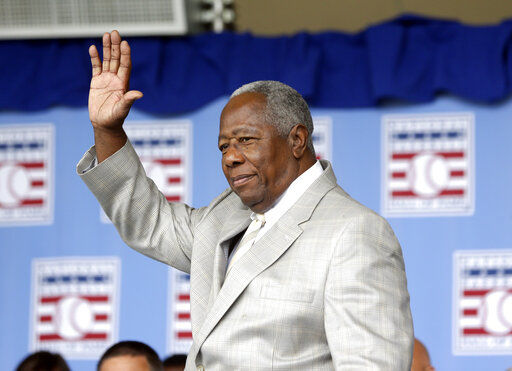
The story always packed as much power as the swing that propelled Hank Aaron’s 715th home run out of Atlanta’s Fulton-County Stadium when he broke Babe Ruth’s career record in 1974.
Aaron always spoke louder with his bat and glove than he did with his voice during his 23 seasons in the big leagues with the Braves and then the Brewers at the end.
The dignity in his bearing and demeanor made his points more clearly than 755 home runs, 2,297 runs batted in and .305 batting average ever did. And the same was true on a July day in 2012 inside the Negro Leagues Baseball Museum in Kansas City.
His voice, riveting attention from 200 listeners, was earnest and firm. Even if it was obvious that nearly 40 years earlier his insides were shaky and his mind reeled because his simple pursuit of a sporting record stirred up so much hate.
As important as Ruth’s charisma and home runs were in helping save Major League Baseball in the 1920s after the Black Sox gambling scandal almost wrecked its credibility with the public, there was no excuse for the poison of racism to be inserted into Aaron’s home-run chase.
Yet it was, with him taking refuge in hotel rooms under assumed names, with the FBI investigating threatening mail, just because he was a black man about to shove aside a revered white man in the sport’s record books.
Over this past year, we have repeatedly witnessed the evils of racism on a grand scale resulting in unwarranted deaths, have read the ugliness of racism on too many faces as American society wrestles with what it is, what it has been and what it aspires to be.
On that day in Kansas City, baseball fans came to see and hear Aaron, Frank Robinson, another proud African-American Hall of Famer, and Dave Winfield, a third, who moderated the forum.
The setting was distinctly appropriate, a shrine to African-American superstar baseball players whose careers were blockaded by baseball’s color barrier, men like Josh Gibson, Cool Papa Bell, Buck Leonard and so many others who despite their talent on the field were snubbed by big-league owners because of institutionalized racism.
By 1974, Aaron’s longevity and numbers informed all baseball fans the Babe was in reach. Baseball was the National Pastime, the United States’ pre-eminent sport. No number in a game obsessed by records was more appreciated or better known than 714.
Aaron, a son of the South who grew up in Mobile, Alabama, made his first professional baseball money of $200 a month in his teens playing for the Indianapolis Clowns in the Negro American League in 1951. He was 20 breaking in with the Milwaukee Braves, forerunner of the Atlanta version, in 1954, and a perennial All-Star.
His deeds had earned the respect of the baseball world, the cities where he played, and of those who knew him well, or simply only briefly met him. His character seemed flawless, so the crackpots’ reception stung even more.
“The last two years of my career were probably the toughest of my 23 years,” Aaron said on that stage in Kansas City. “It was kind of sad for me and it should have been joyful for me. i was merely playing baseball. I don’t know where I got the strength.”
During the lead-up to the milestone home run on April 8, 1974, Aaron’s son needed a police escort to public school for his safety and his daughter attending Fisk University required FBI protective custody.
All precautions were taken and nothing horrible happened on the watch of the authorities.
“God had wrapped me in his hand and I was very safe when I got to the ballpark,” Aaron said those many years later.
What a shame and disgrace for Aaron to have his experience tarnished by extremists who couldn’t even spell all their nasty words correctly in their hideous letters.
Aaron lived long and prospered — he was 86 when he passed away Friday — his baseball numbers long before gaining him induction into the Baseball Hall of Fame.
However, Hank Aaron had also long before become acclaimed as an esteemed baseball elder, as a man who epitomized grace under pressure, and as someone admired as much for who he was as his athletic achievements.
